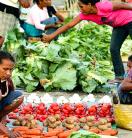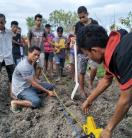New crop varieties boost food security in Timor-Leste
Nineteen new crop varieties have been released in Timor-Leste through ACIAR-funded research, helping smallholder farming communities improve production and food security.
Launched recently at an international seminar in Dili, the Ministry of Agriculture, Livestock, Fishery, and Forestry (MALFF), unveiled the ground-breaking varieties, bringing to fruition 2 decades of agricultural research between Australia and Timor-Leste.
The new varieties, including red rice, hybrid corns, winged beans and common beans, were developed through research coordinated by the University of Western Australia (UWA) and have already been widely adopted by smallholder farmers nationwide.
The ceremony was attended by the President of Timor-Leste, His Excellency Dr José Ramos Horta, and showcased a range of innovative agricultural solutions that promise to transform the country's farming practices.
ACIAR Project Leader from the UWA, Associate Professor Louise Barton, said the cropping innovations have been popular with farming communities and congratulated local research teams for their achievement.
‘The successful launch of these new agricultural varieties is a testament to Timor-Leste's researchers' unwavering dedication and hard work. Previously released varieties have not only reduced the country's dependence on seed imports, but have also gained widespread adoption among local farmers, with over 90% of local farmers embracing these innovative agricultural solutions, underscoring their effectiveness and importance,’ said Associate Professor Barton.
‘The launch highlighted the transformative potential of these agricultural innovations and served as a moment of inspiration and celebration for all those involved in the AI-Com 2 program. It is a testament to the power of collaboration and research in driving positive change within the agricultural sector, promising a brighter and more sustainable future for Timor-Leste's farming communities.’
Commencing in 2016 and led by the UWA, the Agricultural Innovations for Communities (AI-Com) project aims to improve agricultural productivity and profitability in Timor-Leste by addressing technical and social impediments to annual crop intensification. Now in its second phase, the project is improving rural livelihoods with a focus on adoption pathways for technologies and knowledge developed in the first phase.
ACIAR Research Program Manager, Crops, Dr Eric Huttner, said the release of the new crop varieties add to the long-running legacy of ACIAR-funded research in Timor-Leste.
‘The work by UWA since 2016 has continued the legacy of the Seeds of Life program that ran for the 16 years prior. The program was ACIAR’s most significant investment in Timor-Leste and contributed to the country’s scientific infrastructure, including helping to establish a national seed system,’ said Dr Huttner.
‘Seeds of Life trained 2,600 people, including farmers, NGO staff, employees from the Ministry of Agriculture and Fisheries, and gave more than 65,000 farming families access to 19 improved varieties of high-yielding certified seed for food crops.
‘It’s fantastic that the AI-Com project, led by the UWA, is continuing the legacy of providing Timor’s farmers with improved varieties that will further strengthen food and nutrition security.’
AI-Com 2 is funded through the ACIAR Crops Research Program for A$3.1 million and is scheduled to run until 2027. Learn more about the project via the ACIAR website.




